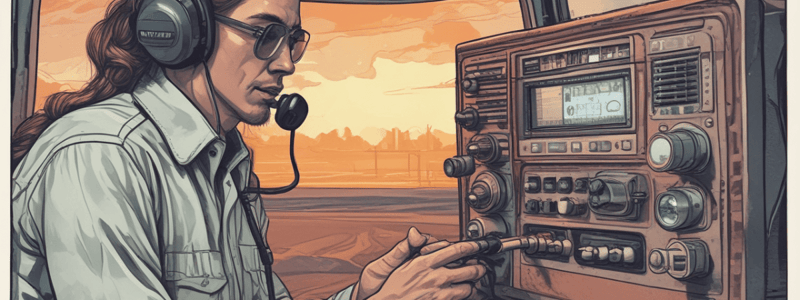Podcast
Questions and Answers
What should members do when I-calling another radio?
What should members do when I-calling another radio?
- Alert the dispatcher of the I-call
- Discontinue use of electronic devices
- The radio being called will be pulled off their talkgroup for a time (correct)
- Continue to listen to talkgroup audio
Why should members discontinue use of electronic devices in certain areas?
Why should members discontinue use of electronic devices in certain areas?
- To prevent damage to the devices
- To avoid triggering explosive devices (correct)
- To minimize distractions during calls
- To prevent interference with radio signals
What should members do when acknowledging radio calls from the dispatcher?
What should members do when acknowledging radio calls from the dispatcher?
- Give a brief description of the situation
- Give their complete radio number first
- Give east/west street locations first (correct)
- Give their location first
What is the purpose of advising the dispatcher of changes in a call's status?
What is the purpose of advising the dispatcher of changes in a call's status?
Why should members keep car-to-car transmissions at a minimum?
Why should members keep car-to-car transmissions at a minimum?
What should members do when using the radio to communicate with other members?
What should members do when using the radio to communicate with other members?
Why should members be professional and refrain from using uncivil language?
Why should members be professional and refrain from using uncivil language?
What should members do when leaving their assigned talkgroup?
What should members do when leaving their assigned talkgroup?
What type of transmission does not use a talkgroup and can be heard by radio scanners?
What type of transmission does not use a talkgroup and can be heard by radio scanners?
What is the purpose of the Radio Identification Number (RID) in a radio system?
What is the purpose of the Radio Identification Number (RID) in a radio system?
What is the primary function of a repeater in a radio system?
What is the primary function of a repeater in a radio system?
Which type of transmission is typically not capable of communicating with dispatch?
Which type of transmission is typically not capable of communicating with dispatch?
What is the primary difference between Simplex or Direct transmission and other types of transmission?
What is the primary difference between Simplex or Direct transmission and other types of transmission?
What is the purpose of a System or Zone in a radio system?
What is the purpose of a System or Zone in a radio system?
What is a common characteristic of E.P25 Conventional transmissions?
What is a common characteristic of E.P25 Conventional transmissions?
What can be decoded by receiving units in a radio system?
What can be decoded by receiving units in a radio system?
What is the primary mode of radio communication used in the 8MA system?
What is the primary mode of radio communication used in the 8MA system?
What is the purpose of encrypting a radio transmission?
What is the purpose of encrypting a radio transmission?
Who should members contact if they have questions regarding radio operation not covered in the directive?
Who should members contact if they have questions regarding radio operation not covered in the directive?
What is the name used to designate a particular frequency the radio will use in conventional mode?
What is the name used to designate a particular frequency the radio will use in conventional mode?
Can dispatch hear conventional radio transmissions?
Can dispatch hear conventional radio transmissions?
What is an example of a conventional channel?
What is an example of a conventional channel?
What is the primary purpose of this directive?
What is the primary purpose of this directive?
What is a characteristic of analog conventional mode?
What is a characteristic of analog conventional mode?
Flashcards are hidden until you start studying
Study Notes
Radio Communications
Considerations
- When calling another radio, the called radio will be pulled off its talkgroup for a time and will not hear any talkgroup audio, including dispatch calls.
- Electronic devices should be discontinued and turned off within 100 yards of suspected explosive devices or in construction areas with warning signs.
Radio Usage Guidelines
- Keep radio volume at an audible level when in-service and remain attentive to calls.
- Be professional and refrain from using uncivil, harsh, or vulgar language.
- Confine radio transmissions to official police business and information.
- Keep car-to-car transmissions at a minimum and limit them to official police business.
- Always acknowledge radio calls from the dispatcher by giving east/west street locations first and complete radio numbers.
- Identify yourself by complete radio number when using the radio to communicate with other members.
- Advise the dispatcher of any change in the status of a call, including change of location.
- Advise the dispatcher via radio when 10-23 on all calls when the Mobile Data Computer (MDC) is not available or cannot be used.
- Notify the dispatcher prior to leaving their assigned talkgroup.
Radio Terminology
- I-Call: A specific type of radio transmission between two radios through the radio system where a talkgroup is not used.
- P25 Conventional: A digital form of conventional mode where radio transmissions do not pass through the radio system and are typically not capable of communicating with dispatch.
- Radio Identification Number (RID): A number assigned to each radio, sent every time Push to Talk (PTT) is pressed, and can be decoded by receiving units.
- Repeater: Receives a signal and re-transmits it, usually with higher power and from a better location, to provide a greater communication range.
- Simplex or Direct: A conventional mode where radios communicate with each other directly, transmit, receive, and operate on the same frequency and with no repeater or other device in between.
- System or Zone: The name of a set of talkgroups or channels.
Studying That Suits You
Use AI to generate personalized quizzes and flashcards to suit your learning preferences.





